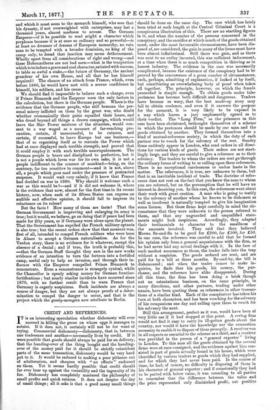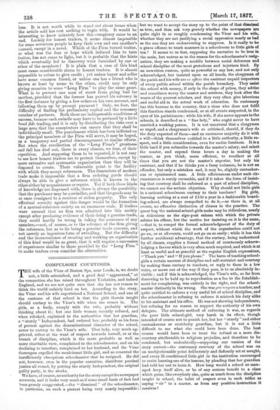CREDIT AND REFERENCES.
should be done on the same day. The case which has lately been tried at such length at the Central Criminal Court is a conspicuous illustration of this. There are no startling figures in it, and when the number of the persons concerned in the conspiracy, and the sacrifice at which much of the goods obtained must, under the most favourable circumstances, have been dis- posed of, are considered, the gain in many of the items must have been almost infinitesimal. Still there was gain, and as there was next to no outlay incurred, this was sufficient inducement, at a time when there is as much competition in thieving as in honest industry. The evidence in the ease was necessarily complicated, because the existence of the conspiracy had to be proved by the concurrence of a great number of circumstances, each, perhaps, admitting of explanation, if looked at by itself, but constituting an overwhelming body of proof when taken all together. The principle' however, on which the frauds proceeded is simple enough. To obtain goods under false pretences has become both difficult and dangerous. Traders have become so wary, that the best made-up story may fail to obtain credence, and even if it answers the purpose for the moment, it is very likely to be exposed in a way which leaves a jury unpleasantly agreed as to their verdict. The "Long Firm," as the prisoners in this case have been christened, bethought themselves of a scheme in which the pretences should be made by one man and the goods obtained by another. They formed themselves into a kind of mutual-reference society, in which the duty of each partner was to vouch for the solvency of the rest. Sundry firms suddenly appear in London, who send orders in all direc- tions for various kinds of goods. Their orders are not start- lingly large, and they are careful to give a reference as to their solvency. The traders to whom the orders are sent go through the ordinary forms of writing to or calling upon these references. There is no exceptional carelessness or undue haste in the matter. The references, it is true, are unknown to them, but that is an inevitable incident of trade. The doctrine of refer- ences does not rest on the fact that you know the man to whom you are referred, but on the presumption that he will have no interest in deceiving you. In this case, the references went about their work with great caution. A man who is going to testify to the solvency of another whom he knows to be dishonest as well as insolvent is naturally tempted to give his imagination some license. But these firms kept carefully in mind the cir- cumstance that they were unknown to the person referred to them, and that any unguarded and unqualified state- ments might look suspicious. Accordingly, they adapted their testimonials to character to the smallness of the amounts involved. They said that they believed Messrs. So-and-So to be good for £200, for £100, for £50. In one case, the reference was careful to add that he formed his opinion only from a general acquaintance with the firm, as he had never had any actual dealings with it. In the face of such modest assurances as these, the trader falls into the trap without a suspicion. The goods ordered are sent, and are paid for by a bill at three months. By-and-by, the bill is dishonoured ; and when the trader comes to make in- quiries, he finds that his goods, his money, the pur- chaser, and the reference have alike disappeared. During all this time, the firm has been doing a brisk though not an ostentatious business, on the same principle, in many directions, and other partners, trading under other names, have been quoting them as references in other transac- tions of a similar kind. Each of the conspirators has taken his turn at both characters, and has been vouching for the solvency of his companions one day and calling upon them to vouch for his solvency the next.
Still this arrangement, perfect as it was, would have been of very little use if it had stopped at this point. A roving firm would not find it easy to carry its ill-gotten goods about the country, nor would it have the knowledge nor the connection necessary to enable it to dispose of them promptly. A receiver was in all respects as essential to the scheme as a thief, and a receiver was provided in the person of a "general exporter" living in London. To this man all the goods obtained by the several firms were at once consigned, and the evidence against him con- sisted in part of goods actually found in his house, which were identified by various traders as goods which they had supplied, and for which they had never been paid. In the course of time he had, of course, no difficulty in disposing of them in his Character of general exporter ; and if occasionally they had to be parted with below value, it was consoling to all parties to remember that the difference between the value and the price represented only diminished profit, not positive
loss. It is not worth while to stand out about terms when the article sold has cost nothing to begin with. It would be interesting to know minutely how this conspiracy came to an end. Luckily for honest traders, it seems almost impossible for some seventeen people to keep their own and one another's counsel, except in a novel. Which of the Firm turned traitor, or what was the fear or hope which induced him to turn traitor, has not come to light, but it is probable that the hints which eventually led to discovery were furnished by one or other of the members It is plain that a case of this kind must cause considerable alarm to honest traders. It is almost impossible to refuse to give credit ; yet unless buyer and seller have some common friend, or unless one has a friend who is known at least by name to the other, credit may be only giving occasion to some "Long Firm" to play the same game. What is to prevent one man of straw from going bail for another, provided that the former has proved his solvency in the first instance by giving a few orders on his own account, and following them up by prompt payment ? Only, we fear, the difficulty of finding the preliminary capital and the necessary number of partners. Both these are indispensable conditions of success, because each swindle may have to be prefaced by a little bond fide trading, and it is only by distributing the risks over a large area that the conspirators can ensure that they shall be individually small. The punishment which has been inflicted on the principal members of the Firm will serve, it may be hoped, as a temporary and partial discouragement to similar efforts. But when the recollection of the "Long Firm's" greatness and fall has died out, there is every chance, we fear, of their repetition. And supposing them to be repeated, it is not easy to see how honest traders are to protect themselves, except by more extensive and systematic organisation than they will be disposed to create. Their vulnerable point is the facility with which they accept references. The dimensions of modern trade make it impossible that a firm ordering goods should always be able to give a reference which is known to the other either by acquaintance or repute. Yet if both these kinds of knowledge are dispensed with, there is always the possibility that the purchaser may be a swindler, and that the goods may be at once consigned to a receiver of stolen property. The only effectual security against this danger would be the formation of a mutual-reference society on an enormous scale. If traders were assured that no firm was admitted into this society except after producing evidence of their doing a genuine trade, they could hardly be wrong in taking the assurance of any member,—not, of course, as to the solvency of the firm giving the reference, but as to its being a genuine trade concern, and not merely an ingenious form of swindling. But the difficulty and the inconvenience of creating and working an organisation of this kind would be so great, that it will require a succession of experiences similar to those provided by the "Long Firm" to make traders even consider the alternative.



































 Previous page
Previous page